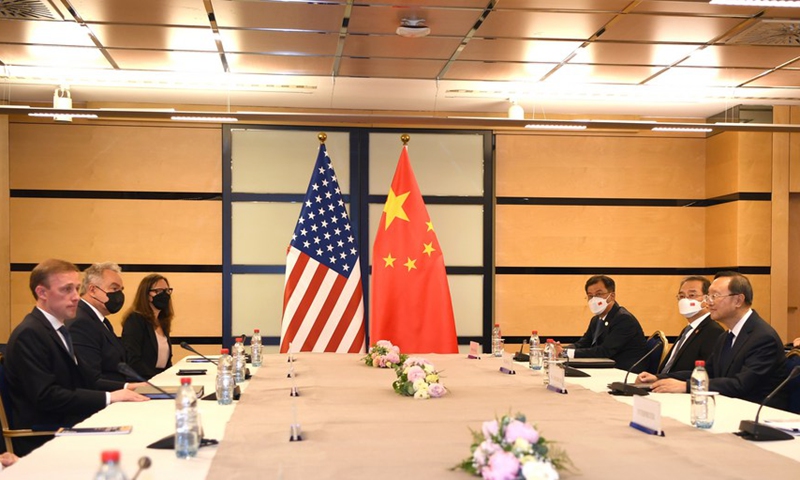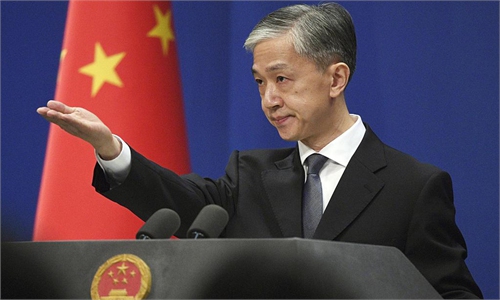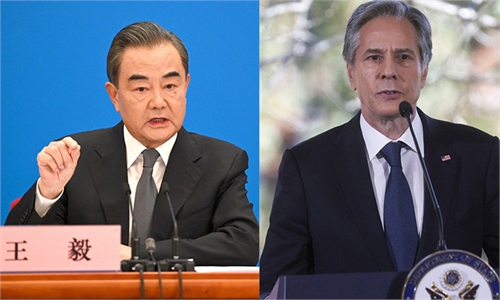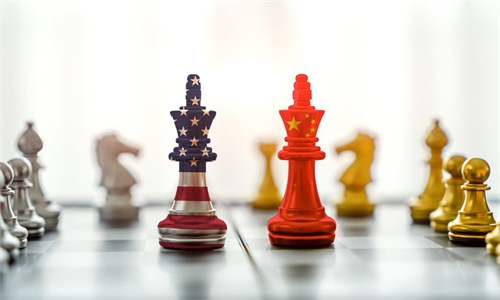Consistency of US’ words, deeds key to easing China-US ties: Global Times editorial

Yang Jiechi (1st R), a member of the Political Bureau of the Communist Party of China (CPC) Central Committee and director of the Office of the Foreign Affairs Commission of the CPC Central Committee, meets with U.S. National Security Advisor Jake Sullivan (1st L) in Luxembourg, on June 13, 2022.(Photo: Xinhua)
Yang Jiechi, a member of the Political Bureau of the Communist Party of China (CPC) Central Committee and also director of the Office of the Foreign Affairs Commission of the CPC Central Committee, met with US National Security Advisor Jake Sullivan in Luxembourg on June 13 local time. Their talks lasted four and a half hours. As it was not announced beforehand, international public opinion found the news about the meeting a little sudden and unexpected, thus adding expectation for the relaxation of China-US relations.The Chinese press release summed up this communication and exchange with the words "candid, in-depth and constructive," and the readout of the White House also expressed with similar vocabulary as "candid, substantive and productive."
Both sides emphasized that it is necessary and beneficial for China and the US to maintain smooth communication channels. The US also revealed that there may be " additional potential meetings" in the months ahead.
Public opinion quickly noticed that these messages were relatively positive. We also hope to see that the US can take more practical actions to fulfill and prove the statements and commitments it made to China, instead of continuing to make disappointing moves of saying one thing but doing another as it did frequently before.
During the meeting, Yang pointed out that the US should correct its strategic perceptions of China, make the right choices, and translate President Biden's commitments into concrete actions, working together with China in the same direction and concretely implementing the important consensus reached by the two heads of state.
This attitude has been reiterated by Chinese side in almost all high-level talks between the two countries in recent times. This is the crux of the current impasse in China-US relations. When China will not need to say these words again, China-US relations will probably start to truly turn around.
Before the Yang-Sullivan meeting, the defense chief of China just met his US counterpart in Singapore. Some US media outlets commented that "the temperature of the US-China rivalry has been dialed down a few notches," judging from the latest signs. China-US relations cannot afford further deterioration and must be stabilized as soon as possible. US manipulation of the Taiwan question to contain China has made the risk of a showdown between China and the US increase objectively. Reducing misunderstanding and misjudgment and properly managing differences have become an urgent practical need of the two countries. But this is only a bottom line that peaceful coexistence between China and the US must safeguard.
The continuous tensions in China-US relations have exerted an increasingly prominent negative spillover effect on the international landscape, triggering wide concern. WTO Director-General Ngozi Okonjo-Iweala warned recently that China-US decoupling would be a bigger economic hit than the 2008 global financial crisis. Well-known public figures in the US and West, such as Henry Kissinger and Niall Ferguson, called on the US government to ease tensions with China. More and more Americans have realized that all-out crackdown and suppression of China didn't benefit the US much, and they are impossible to crush China either. None of the US domestic problems have been eased, and have only worsened. All these deserve Washington's reflection.
President Biden, since the beginning of his presidency, has had the power and resources to adjust his China policy and improve bilateral relations. But regrettably, such opportunities have been repeatedly wasted. Despite this, China always believes that stable and constructive China-US relations are conducive to China and the US, but also to the world.
One of the biggest obstacles for the US to improve China policy is that some US political elites cannot abandon their arrogance and prejudice. In our view, the relaxation of China-US ties must be based on respect for each other's core interests, and cannot be what the US has shown repeatedly: crazily suppressing China on one hand, and expecting China to "cooperate" on the other. Such an extremely selfish idea of the US has never been realized in the past, and will never be realized in the future.
In any circumstance, dialogue is better than confrontation, and communication is better than isolation. But the experience also tells us that we should not only listen to what the US says, but also watch what it does. In other words, using some pretty words to strategically confuse China will produce nothing positive, but only make the US be on the Chinese "blacklist" of credibility.
China has always adhered to the three principles of "mutual respect, peaceful coexistence and win-win cooperation" to develop its relations with the US. It is also hoped that the US can fulfill its commitments.



